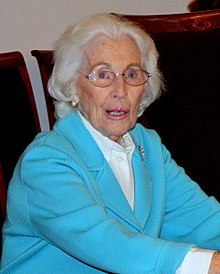Hildegard Hamm-Brücher
This article needs additional citations for verification. (April 2011) |
You can help expand this article with text translated from the corresponding article in German. (May 2021) Click [show] for important translation instructions.
|

Hildegard Hamm-Brücher (11 May 1921 – 7 December 2016) was a liberal politician in Germany.[1] She held federal state secretary positions from 1969 to 1972 and from 1977 to 1982. She was the Free Democratic Party's candidate in the first two rounds of the federal presidency elections in 1994.
Early life and education
Hamm-Brücher was born in
Political career
Hamm-Brücher joined the
In 1982, the Free Democratic Party left that coalition in order to form a new coalition with the
Her party nominated her as the Free Democrats' candidate in the German presidential election in 1994. However, the Free Democratic Party, then still in a coalition with the much larger Christian Democratic Union under Chancellor Kohl, ultimately chose to support the Christian Democrat's candidate Roman Herzog in the election's third round. Herzog went on to win the election with the combined majority of Christian and Free Democrats.[2]

In 2002, Hamm-Brücher left the Free Democratic Party after a controversy with
Hamm-Brücher died on 7 December 2016 at the age of 95.[5]
Other activities
Hamm-Brücher authored several books and articles, often focussing on the state of modern democracy and the relationship between politics and ethical questions. She was a member of the
Recognition
- 1992 – Buber Rosenzweig Medal (together with Annemarie Renger)
References
- ISBN 978-3-89244-322-3. Retrieved 16 April 2011.
- ISSN 0044-2070. Retrieved 17 December 2016.
- ISSN 0174-4917. Retrieved 10 December 2016.
- ^ Ordentliche Mitglieder der 15. Bundesversammlung Bundestag.
- ^ "FDP-Urgestein: Hildegard Hamm-Brücher ist tot". Spiegel Online (in German). 9 December 2016. Retrieved 10 December 2016.
- ^ "Boards - General Meeting" Goethe-Institut. Retrieved 2016-12-12.
External links
 Media related to Hildegard Hamm-Brücher at Wikimedia Commons
Media related to Hildegard Hamm-Brücher at Wikimedia Commons- Literature by and about Hildegard Hamm-Brücher in the German National Library catalogue
- Grimmer, Claudia (12 May 2016). "Hildegard Hamm-Brücher feiert 95. Geburtstag" (in German). Bayerischer Rundfunk. Archived from the original on 12 May 2016. Retrieved 17 December 2016.
